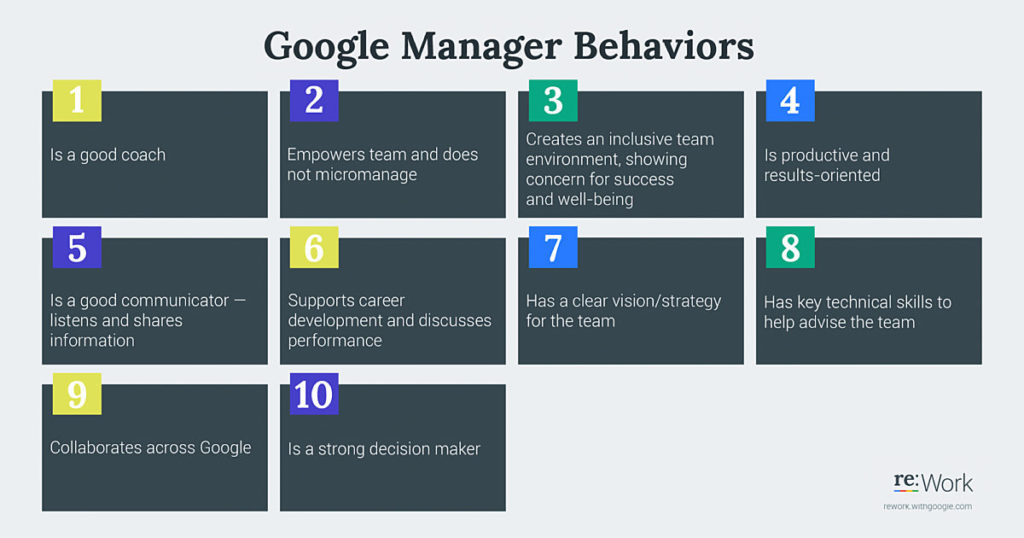Research shows that managers matter. Employee engagement is linked to productivity, quality (fewer errors), lower turnover, less absenteeism and theft, and fewer safety incidents; and guess what: 70% of employee engagement is accounted for by team managers.
But that wasn’t always a known fact. That’s how, back in 2002, tech giant Google decided to get rid of all it’s managers, having decided that they were a layer of bureaucracy that it didn’t need.
Needless to say it didn’t go well. And so in 2008, Google set out – in a plan code-named Project Oxygen – to understand why managers are so important, and what makes a good manager.
They surveyed employees about their managers and sifted through the comments, as well as the performance evaluations of managers, and finally conducted double-blind interviews with a group of the best and worst managers to find examples of what these two groups were doing differently.
With follow-up research using an additional 10 years of data, in 2018 the research team settled on ten common behaviors they found across all high-scoring managers.
In the final analysis, they found that the best scoring manager:
1. Is a good coach
Like the coach of a sports team, a good coach uses problems as a chance to listen (research shows that the more a manager listens, the better people think they are at giving feedback), ask questions, raise awareness around ‘blind spots,’ and challenge thinking and deeply held beliefs.
That includes behaviors like:
- Having regular 1:1s with your team member and being fully present and focused on the team member
- Being aware of your own mindset and that of the team member
- Practicing active listening and asking open-ended questions to facilitate the team member’s own insight (questions that start with “what” and “how” encourage expansive thinking)
- Providing specific and timely feedback
- Balancing positive (motivational) and negative (constructive) feedback and understand the unique strengths and development areas of each team member
2. Empowers their team and does not micromanage
Avoiding micromanagement can help build a culture of trust and accountability within a team. That includes:
- Delegating work to your team and supporting team members who take initiative on new ideas.
- Balancing giving freedom with being available for advice. One Googler described how a manager empowered her team: “She lets people run with ideas, but knows when to step in and offer advice to not pursue a failing issue.”
- Making it clear you trust you team. Give team members the authority to make decisions on their projects without constant check-ins.
- Advocating for the team in the wider organization, like sharing your team’s accomplishments with more senior managers and beyond.
3. Creates an inclusive team environment, showing concern for success and well-being
Great managers create “psychological safety” – an environment where team members are comfortable expressing their views and feel free to suggest new ideas and to contribute in brainstorming activities.
Google offers these tips to managers to cultivate compassion for team members:
- Ask how you can help, and don’t assume you know what’s wanted.
- Look for commonalities with your team members.
- Encourage cooperation instead of competition in your team.
- Cultivate a genuine curiosity about the individuals on your team.
- Lead by example; treating others with compassion is contagious.
- Be mindful of boundaries; avoid being an emotional sponge.
4. Is productive and results-oriented
Google found that managers whose teams were productive and delivered results did these five things:
- Kept the team focused on results;
- Helped the team prioritize;
- Removed roadblocks;
- Were clear about who owns what; and
- Were hard workers and set the pace for the team.
5. Is a good communicator — listens and shares information
Good communicators should be able to:
- Acknowledge emotion: “You seem frustrated/upset/happy about this.”
- Summarize what you’ve heard to ensure you understand, highlighting the key points: “It sounds like …”, “In other words …”, or “So you are saying …”.
- Use uncertainty to get clarification on the other’s frame of reference: “I’m not sure I understand, can you say more about …”
- Respond with acceptance and empathy “I see why this matters to you”, or “I can understand why you’d feel that way.”
6. Supports career development and discusses performance
Google suggests using the GROW coaching model for this task. GROW incorporates these four elemtents:
- Goal: Establish what the team member really wants to achieve with their career.
- Reality: Establish the team member’s understanding of their current role and skills.
- Options: Generate multiple options for closing the gap from goal to reality.
- Will: Identify achievable steps to move from reality to goal.
7. Has a clear vision/strategy for the team
Google says a clear team vision is helpful for a number of reasons:
- It allows the team members to stay focused. One highly-rated manager at Google explained that “having a compelling, shared vision is crucial to the success of your team, as it allows all of you to stay focused and move forward in the same direction. Conversely, not having a vision can dramatically hurt your team through lack of focus and a commensurate lack of momentum.”
- Team members can see where they’re going. A clear vision means that everyone on the team knows where they’re going, if they’re on track, and what success looks like.
- It helps teams decide what to work on. A clear vision helps teams make trade-offs and prioritize. Managers should tie back to the vision when communicating decisions.
8. Has key technical skills to help advise the team
According to Google, “having the technical skills to work alongside the team helps managers act as credible advisors by showing they have deep expertise in their field. It can help them keep their skills current and sends an important message: the manager is not just the leader but a participant on the team.”
9. Collaborates effectively
One study funded by Google found that while good ideas from new employees usually didn’t get very far within the organisation, “when a new employee partnered with a seasoned employee, their good ideas were more likely to develop into something meaningful, thanks to the extra context, support, and connections of the seasoned employee.”
To bring more good ideas to light, think about how you can help your employees connect with one another to share and collaborate on ideas.
10. Is a strong decision maker
And finally, decision making. Important manager decisions include those around hiring, performance, promotion and pay – decisions that deeply affect the lives of their team.
Great managers use a systematic approach to making decisions in these important areas, including measuring outcomes and feeding data back into the process – rather than relying on instinct, intuition or routine, where unconscious bias can slip in.

Does your NFP train and promote managers who do these 10 things? If not, how can you start to make a change towards more effective managers for your organisation?
Related Posts



